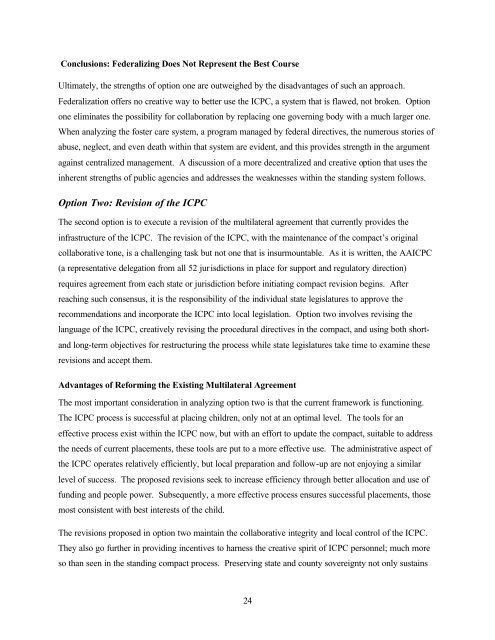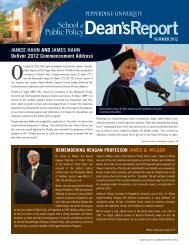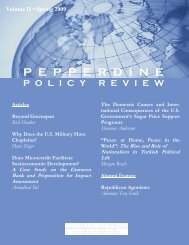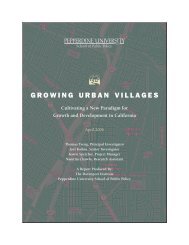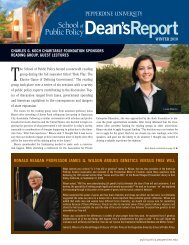Finding Permanent Homes for Adoptable Children - Pepperdine ...
Finding Permanent Homes for Adoptable Children - Pepperdine ...
Finding Permanent Homes for Adoptable Children - Pepperdine ...
You also want an ePaper? Increase the reach of your titles
YUMPU automatically turns print PDFs into web optimized ePapers that Google loves.
Conclusions: Federalizing Does Not Represent the Best Course<br />
Ultimately, the strengths of option one are outweighed by the disadvantages of such an approach.<br />
Federalization offers no creative way to better use the ICPC, a system that is flawed, not broken. Option<br />
one eliminates the possibility <strong>for</strong> collaboration by replacing one governing body with a much larger one.<br />
When analyzing the foster care system, a program managed by federal directives, the numerous stories of<br />
abuse, neglect, and even death within that system are evident, and this provides strength in the argument<br />
against centralized management. A discussion of a more decentralized and creative option that uses the<br />
inherent strengths of public agencies and addresses the weaknesses within the standing system follows.<br />
Option Two: Revision of the ICPC<br />
The second option is to execute a revision of the multilateral agreement that currently provides the<br />
infrastructure of the ICPC. The revision of the ICPC, with the maintenance of the compact’s original<br />
collaborative tone, is a challenging task but not one that is insurmountable. As it is written, the AAICPC<br />
(a representative delegation from all 52 jurisdictions in place <strong>for</strong> support and regulatory direction)<br />
requires agreement from each state or jurisdiction be<strong>for</strong>e initiating compact revision begins. After<br />
reaching such consensus, it is the responsibility of the individual state legislatures to approve the<br />
recommendations and incorporate the ICPC into local legislation. Option two involves revising the<br />
language of the ICPC, creatively revising the procedural directives in the compact, and using both short-<br />
and long-term objectives <strong>for</strong> restructuring the process while state legislatures take time to examine these<br />
revisions and accept them.<br />
Advantages of Re<strong>for</strong>ming the Existing Multilateral Agreement<br />
The most important consideration in analyzing option two is that the current framework is functioning.<br />
The ICPC process is successful at placing children, only not at an optimal level. The tools <strong>for</strong> an<br />
effective process exist within the ICPC now, but with an ef<strong>for</strong>t to update the compact, suitable to address<br />
the needs of current placements, these tools are put to a more effective use. The administrative aspect of<br />
the ICPC operates relatively efficiently, but local preparation and follow-up are not enjoying a similar<br />
level of success. The proposed revisions seek to increase efficiency through better allocation and use of<br />
funding and people power. Subsequently, a more effective process ensures successful placements, those<br />
most consistent with best interests of the child.<br />
The revisions proposed in option two maintain the collaborative integrity and local control of the ICPC.<br />
They also go further in providing incentives to harness the creative spirit of ICPC personnel; much more<br />
so than seen in the standing compact process. Preserving state and county sovereignty not only sustains<br />
24


